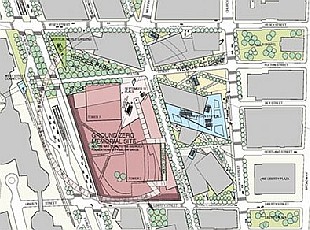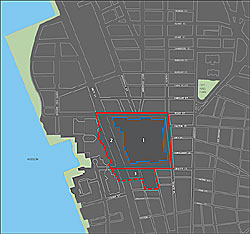You're on an older version of the site, please click here to view the current site
|

Gotham Gazette has gathered a diverse collection of maps of the World Trade Center site-during recovery efforts, of the site now, and plans for the area's future. Look out for new additions to this site as planning continues. Within a few days of the Sept. 11 attacks, a technology team began photographing the disaster area from above with special cameras. They used thermal images to map the location of "hot spots" where fires still burned, hidden in the rubble. These maps helped rescue workers and firefighters navigate the area. A wide array of mapping technologies have been used ever since, as efforts moved from searching through the debris to plotting how a memorial will best fit into a rebuilt site. In the weeks after the disaster, officials used three-dimensional maps to determine the volume of debris in the area that would need to be taken away. These maps were ready before the smoke had cleared, because planes flew over the site and gathered information using a radar-like technology. Hunter College researchers, directed by geography professor Sean Ahearn, analyzed the data and created many maps that the city used to monitor changes at Ground Zero. Many of these maps were later displayed in a Soho gallery exhibition, and are now part of a travelling show. Now, architects and designers are using maps to envision lower Manhattan's future. The New York New Visions coalition, a pro-bono group of architects and planners, used a computer rendering program to develop 38 different maps of what the World Trade Center site may become, depending on how much space is devoted to a memorial. The coalition and several other civic groups have also developed maps that clarify different proposals for the Lower Manhattan, such as burying West Street or creating a transportation hub.
|














